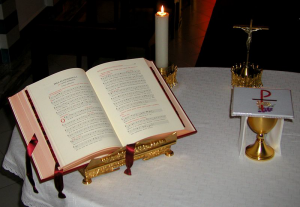
 PEND ENOUGH TIME in the online Catholic Tradosphere, and you come up with a very different reality than, well, reality. I suppose this is true of any specialized group of people online. The internet acts as a kind of centrifuge which separates people of differing opinions and groups like-minded people into their respective corners until we all just keep yelling into an echo chamber of increasing radicalism.
PEND ENOUGH TIME in the online Catholic Tradosphere, and you come up with a very different reality than, well, reality. I suppose this is true of any specialized group of people online. The internet acts as a kind of centrifuge which separates people of differing opinions and groups like-minded people into their respective corners until we all just keep yelling into an echo chamber of increasing radicalism.
One trend I have noticed over the years is the observation that liturgical abuses, and bad liturgy in general, are thought to be the exclusive purview of the Ordinary Form. EF Mass-goers never have to put up with liturgical wackiness or even the general slog of an apathetic priest. Sometimes, I have heard some say that the elimination of the OF altogether would solve this problem, that liturgical abuses would evaporate (for the most part) if the Extraordinary Form was mandatory.
I am not here to argue the differences in content between the two forms. Heck, the first time I attended an EF liturgy, my first observation was how similar the two forms are. They concur far more than they differ. I am simply writing about ars celebrandi, the art of celebration, that definitely has a difference in the forms. Is this something inherent to each form? Perhaps, but I have another suspect in play, too.
None but the most historically ignorant thinks that the preconciliar liturgy was always beauty and Palestrina. The reality in almost every parish was a set of mumbled Low Masses, with one High Mass per Sunday, with Rossini Propers and the smallest congregation of the weekend (it’s the long one, after all). High Mass in 1959 isn’t really the same as High Mass at your average modern FSSP parish. Many priests made it a point to celebrate liturgy well, and many didn’t care as much and muttered their way through the Mass. While the form of the preconciliar liturgy doesn’t allow for as much abuse as the OF, neither can be protected from human weakness or apathy.
This snapshot is what we would find if the OF were abolished tomorrow. The reality is that some priests, just like the laity, don’t care about the liturgy very much, or have other designs as to its purpose. An all-EF Church would contain all of the same priests that the current one does, and the poor celebrants would come with it. The reality is that the EF community is self-selecting. It tends to attract priests and laity that already desire good liturgy, and so they get it. If the same communities celebrated the Ordinary Form, it would be very well done indeed.
As someone who grew up with the Ordinary Form, it is my preference. It is what I’ve always known and am most comfortable praying. However, I am grateful for whatever liturgy Holy Mother Church gives me, and I do not resent the EF in any way. Two forms, one liturgy. My greatest preference would be to celebrate the Ordinary Form with a priest who loves the Extraordinary. I believe this to truly be the “mutual enrichment” of which Pope Benedict spoke, and I hope that that enrichment carries into the future to the benefit of both forms.

